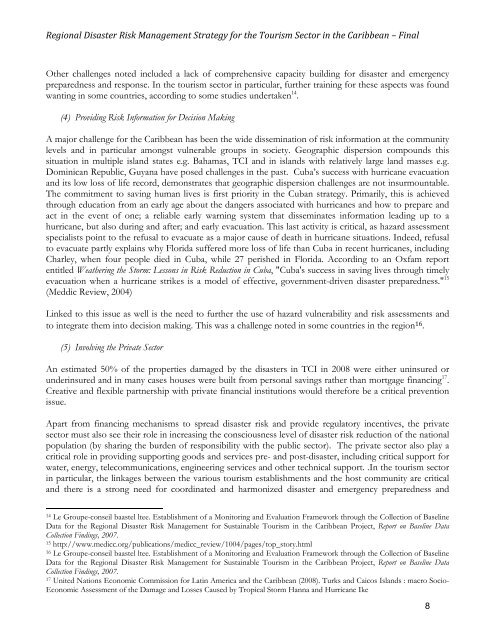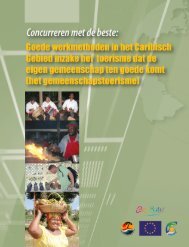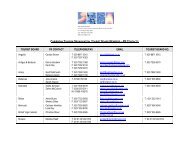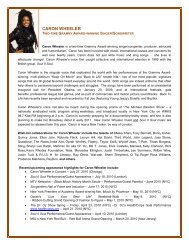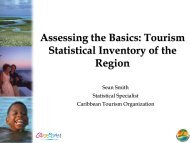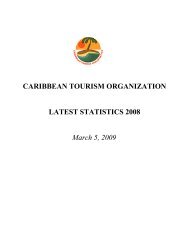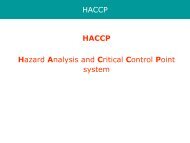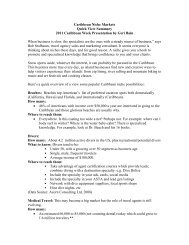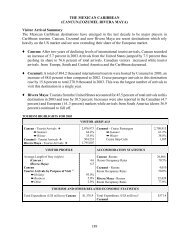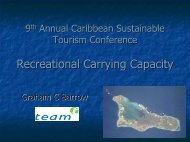Disaster Risk Management Strategy and Plan of Action - Caribbean ...
Disaster Risk Management Strategy and Plan of Action - Caribbean ...
Disaster Risk Management Strategy and Plan of Action - Caribbean ...
Create successful ePaper yourself
Turn your PDF publications into a flip-book with our unique Google optimized e-Paper software.
Regional <strong>Disaster</strong> <strong>Risk</strong> <strong>Management</strong> <strong>Strategy</strong> for the Tourism Sector in the <strong>Caribbean</strong> – Final<br />
Other challenges noted included a lack <strong>of</strong> comprehensive capacity building for disaster <strong>and</strong> emergency<br />
preparedness <strong>and</strong> response. In the tourism sector in particular, further training for these aspects was found<br />
wanting in some countries, according to some studies undertaken 14 .<br />
(4) Providing <strong>Risk</strong> Information for Decision Making<br />
A major challenge for the <strong>Caribbean</strong> has been the wide dissemination <strong>of</strong> risk information at the community<br />
levels <strong>and</strong> in particular amongst vulnerable groups in society. Geographic dispersion compounds this<br />
situation in multiple isl<strong>and</strong> states e.g. Bahamas, TCI <strong>and</strong> in isl<strong>and</strong>s with relatively large l<strong>and</strong> masses e.g.<br />
Dominican Republic, Guyana have posed challenges in the past. Cuba’s success with hurricane evacuation<br />
<strong>and</strong> its low loss <strong>of</strong> life record, demonstrates that geographic dispersion challenges are not insurmountable.<br />
The commitment to saving human lives is first priority in the Cuban strategy. Primarily, this is achieved<br />
through education from an early age about the dangers associated with hurricanes <strong>and</strong> how to prepare <strong>and</strong><br />
act in the event <strong>of</strong> one; a reliable early warning system that disseminates information leading up to a<br />
hurricane, but also during <strong>and</strong> after; <strong>and</strong> early evacuation. This last activity is critical, as hazard assessment<br />
specialists point to the refusal to evacuate as a major cause <strong>of</strong> death in hurricane situations. Indeed, refusal<br />
to evacuate partly explains why Florida suffered more loss <strong>of</strong> life than Cuba in recent hurricanes, including<br />
Charley, when four people died in Cuba, while 27 perished in Florida. According to an Oxfam report<br />
entitled Weathering the Storm: Lessons in <strong>Risk</strong> Reduction in Cuba, "Cuba's success in saving lives through timely<br />
evacuation when a hurricane strikes is a model <strong>of</strong> effective, government-driven disaster preparedness." 15<br />
(Meddic Review, 2004)<br />
Linked to this issue as well is the need to further the use <strong>of</strong> hazard vulnerability <strong>and</strong> risk assessments <strong>and</strong><br />
to integrate them into decision making. This was a challenge noted in some countries in the region 16 .<br />
(5) Involving the Private Sector<br />
An estimated 50% <strong>of</strong> the properties damaged by the disasters in TCI in 2008 were either uninsured or<br />
underinsured <strong>and</strong> in many cases houses were built from personal savings rather than mortgage financing 17 .<br />
Creative <strong>and</strong> flexible partnership with private financial institutions would therefore be a critical prevention<br />
issue.<br />
Apart from financing mechanisms to spread disaster risk <strong>and</strong> provide regulatory incentives, the private<br />
sector must also see their role in increasing the consciousness level <strong>of</strong> disaster risk reduction <strong>of</strong> the national<br />
population (by sharing the burden <strong>of</strong> responsibility with the public sector). The private sector also play a<br />
critical role in providing supporting goods <strong>and</strong> services pre- <strong>and</strong> post-disaster, including critical support for<br />
water, energy, telecommunications, engineering services <strong>and</strong> other technical support. .In the tourism sector<br />
in particular, the linkages between the various tourism establishments <strong>and</strong> the host community are critical<br />
<strong>and</strong> there is a strong need for coordinated <strong>and</strong> harmonized disaster <strong>and</strong> emergency preparedness <strong>and</strong><br />
14 Le Groupe-conseil baastel ltee. Establishment <strong>of</strong> a Monitoring <strong>and</strong> Evaluation Framework through the Collection <strong>of</strong> Baseline<br />
Data for the Regional <strong>Disaster</strong> <strong>Risk</strong> <strong>Management</strong> for Sustainable Tourism in the <strong>Caribbean</strong> Project, Report on Baseline Data<br />
Collection Findings, 2007.<br />
15 http://www.medicc.org/publications/medicc_review/1004/pages/top_story.html<br />
16 Le Groupe-conseil baastel ltee. Establishment <strong>of</strong> a Monitoring <strong>and</strong> Evaluation Framework through the Collection <strong>of</strong> Baseline<br />
Data for the Regional <strong>Disaster</strong> <strong>Risk</strong> <strong>Management</strong> for Sustainable Tourism in the <strong>Caribbean</strong> Project, Report on Baseline Data<br />
Collection Findings, 2007.<br />
17 United Nations Economic Commission for Latin America <strong>and</strong> the <strong>Caribbean</strong> (2008). Turks <strong>and</strong> Caicos Isl<strong>and</strong>s : macro Socio-<br />
Economic Assessment <strong>of</strong> the Damage <strong>and</strong> Losses Caused by Tropical Storm Hanna <strong>and</strong> Hurricane Ike<br />
8


